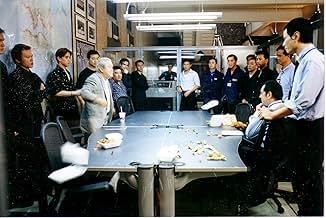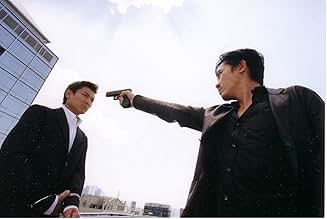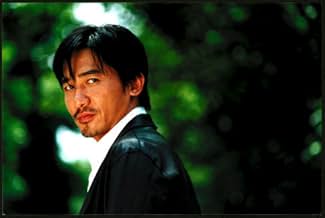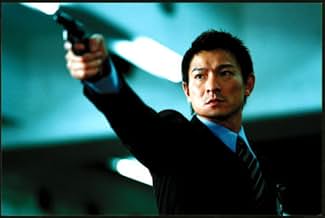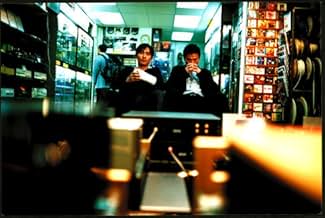Uma história entre um espião do departamento de polícia e um policial encoberto. Seus objetivos são os mesmos: descobrir quem é o espião e quem é o policial.Uma história entre um espião do departamento de polícia e um policial encoberto. Seus objetivos são os mesmos: descobrir quem é o espião e quem é o policial.Uma história entre um espião do departamento de polícia e um policial encoberto. Seus objetivos são os mesmos: descobrir quem é o espião e quem é o policial.
- Direção
- Roteiristas
- Artistas
- Prêmios
- 24 vitórias e 26 indicações no total
Tony Leung Chiu-wai
- Chen Wing Yan
- (as Tony Leung)
Anthony Chau-Sang Wong
- SP Wong Chi Shing
- (as Anthony Wong)
Ka-Tung Lam
- Inspector B
- (as Lam Ka Tung)
Ting Yip Ng
- Inspector Cheung
- (as Ng Ting Yip)
Chi-Keung Wan
- Officer Leung
- (as Wan Chi Keung)
Kam Fung Hui
- Cadet School Principal
- (as Hui Kam Fung)
- Direção
- Roteiristas
- Elenco e equipe completos
- Produção, bilheteria e muito mais no IMDbPro
Avaliações em destaque
A deceptively simple idea lies at the heart of this complex thriller: the Hong Kong police and a triad gang both have an informer in each other's organisation: whoever's man picks the enemies' spy first wins the game for his side. Add to that the customary double-agent-doesn't-know-which-side-he-is-on-anymore subplot (doubled, of course), and you have plenty of ingredients for a plot, although it's to the movie's credit that although a little stylised, it never seems false or contrived. Fast-paced and bold, with a generous score, it never insults the viewer's intelligence either, and features just the right level of moral ambiguity. At one level, it's just another thriller, and there's little in the way of wider political or social subtext; but on the other hand, it's a textbook lesson in the art of making this sort of film.
After I enjoyed Martin Scorcese's "The Departed, I decided to watch the film that inspired the celebrated director to re-make it and move the action from Hong Kong to Boston, MA, USA. I must say that I liked the original movie better: 50 minutes shorter than Scorcese's magnificent remake, "Infernal Affairs" is tighter, faster, more compelling and tells the same story better. It does not have a grand acting Jack Nicholson who basically plays Daryl Van Horne with the attitude and "Infernal Affairs" characters don't talk and don't curse as much as they do in "The Departed" but the Hong Kong's movie only benefits from it. As much as I admire Leonardo DiCaprio as Bill Castigan, Tony Leung (Yan) in his role is simply unforgettable.
I'm late in discovering the Hong Kong crime thriller genre so I can only compare "Infernal Affairs (Mou gaan dou))" to its Hollywood compatriots. It grippingly is the equal of such intense examinations of the anguish of undercover cops as "Donnie Brascoe" or dirty cops such as "Narc" or "Training Day."
Key is the dynamic opposite pairing of two leonine, charismatic actors, Tony Leung Chiu Wai, the self-sacrificing heart throb from "Hero (Ying xiong)" and the languid lover from "In the Mood for Love (Fa yeung nin wa)" here as an antsy, anguished too long undercover cop versus Andy Lau as his crisply efficient, ambitious counterpart.
The plot, propelled as well by the music, unpredictably twists and takes hairpin turns from the beginning so that even with helpful flashbacks it's a thrilling roller coaster ride to try to follow the constantly changing loyalties, manipulations, deals and revelations, not unlike the TV series "The Wire."
Regardless, you get that the real battle is for the characters' souls as much as their lives and you hold your breath to the last surprising minute. The initial motivations for how the men came to be at this crossroads will doubtless be explored in the prequel and sequel that haven't been released in the U.S. yet.
The women are just the girlfriends, but they do have separate lives, jobs and choices that impact the men in their lives.
With noted cinematographer Christopher Doyle is listed as a "visual consultant" in the credits, the great bulk of the film takes place at night, like a comparable chase film "Collateral," so it was unfortunate that the print I saw was not pristine.
It was also annoying that the subtitles were white on white illegible and that ideograms that are shown in the scene are not translated, even when the camera rests on them for a length of time that makes one assume something significant is written there.
Key is the dynamic opposite pairing of two leonine, charismatic actors, Tony Leung Chiu Wai, the self-sacrificing heart throb from "Hero (Ying xiong)" and the languid lover from "In the Mood for Love (Fa yeung nin wa)" here as an antsy, anguished too long undercover cop versus Andy Lau as his crisply efficient, ambitious counterpart.
The plot, propelled as well by the music, unpredictably twists and takes hairpin turns from the beginning so that even with helpful flashbacks it's a thrilling roller coaster ride to try to follow the constantly changing loyalties, manipulations, deals and revelations, not unlike the TV series "The Wire."
Regardless, you get that the real battle is for the characters' souls as much as their lives and you hold your breath to the last surprising minute. The initial motivations for how the men came to be at this crossroads will doubtless be explored in the prequel and sequel that haven't been released in the U.S. yet.
The women are just the girlfriends, but they do have separate lives, jobs and choices that impact the men in their lives.
With noted cinematographer Christopher Doyle is listed as a "visual consultant" in the credits, the great bulk of the film takes place at night, like a comparable chase film "Collateral," so it was unfortunate that the print I saw was not pristine.
It was also annoying that the subtitles were white on white illegible and that ideograms that are shown in the scene are not translated, even when the camera rests on them for a length of time that makes one assume something significant is written there.
A seriously refreshing police thriller that cranks up the tension to the max. There's no overblown gunplay or buddy cop crap here, this baby is tight as a drum and will have your nails down to the quick. Superb performances, a tight script and tense direction make this a winner in every department. Pick it up if you can, it's fantastic.
9/10
Niz
9/10
Niz
Beautifully shot, cleverly constructed, humorous, dramatic, and humane. I never felt bored or rushed for a moment. Expect to have to concentrate on who is who, especially at the beginning, who is or might be on to whom and how, and what they might decide to do about it. Others have said that the two leads are excellent and I'm sure they're right, but I especially appreciated Eric Tsang as Sam.
It's elegant without being heartless. I felt the main characters' longing for truth in their lives, and the various different virtues, flaws, loyalties and motivations of many others too.
I was interested to see that virtually all the violence happens off-camera. It reminded me of 'authentic' productions of Classical Greek plays. Their plots often included murders, but violence was not permitted to be shown directly. A character would describe what had happened, and then a tableau of corpses would be revealed, on a wheeled wheels if I remember correctly from one production. Almost the same device is used in this film, and it's very effective when it's done well, as here.
The friend I went with would have liked to the female characters given bigger roles. Personally (I'm a woman myself, if it makes a difference) I don't care about that. I did notice, though, the way the female characters were used as symbols to represent the good and truthful side of life. It struck me, in connection with this, that sex and violence were being treated as opposites, whereas in many US films they are treated almost as two aspects of the same thing and as depending on one another, hardly existing independently. How many plots are driven by the kidnapping or other ill-treatment of the hero's wife/girlfriend/squeeze, so that the violence against her - whether she resists it violently or not - is used to justify and supposedly motivate the whole towering nonsense by virtue of her sexual relationship with the hero? It often seems that the villian's real offence is thought to be less assault on a person, than theft of property. And I wonder if, when the US remake appears, this tedious plot device will have crept in? But I digress - it was just an idea that occurred to me on the way home, and it tells you little about "Infernal Affairs", except that it may be one reason why I found this film refreshing.
An absorbing experience, and has made me more inclined to seek out Asian films in general, as well as films by the same director.
It's elegant without being heartless. I felt the main characters' longing for truth in their lives, and the various different virtues, flaws, loyalties and motivations of many others too.
I was interested to see that virtually all the violence happens off-camera. It reminded me of 'authentic' productions of Classical Greek plays. Their plots often included murders, but violence was not permitted to be shown directly. A character would describe what had happened, and then a tableau of corpses would be revealed, on a wheeled wheels if I remember correctly from one production. Almost the same device is used in this film, and it's very effective when it's done well, as here.
The friend I went with would have liked to the female characters given bigger roles. Personally (I'm a woman myself, if it makes a difference) I don't care about that. I did notice, though, the way the female characters were used as symbols to represent the good and truthful side of life. It struck me, in connection with this, that sex and violence were being treated as opposites, whereas in many US films they are treated almost as two aspects of the same thing and as depending on one another, hardly existing independently. How many plots are driven by the kidnapping or other ill-treatment of the hero's wife/girlfriend/squeeze, so that the violence against her - whether she resists it violently or not - is used to justify and supposedly motivate the whole towering nonsense by virtue of her sexual relationship with the hero? It often seems that the villian's real offence is thought to be less assault on a person, than theft of property. And I wonder if, when the US remake appears, this tedious plot device will have crept in? But I digress - it was just an idea that occurred to me on the way home, and it tells you little about "Infernal Affairs", except that it may be one reason why I found this film refreshing.
An absorbing experience, and has made me more inclined to seek out Asian films in general, as well as films by the same director.
Você sabia?
- CuriosidadesWhen Yan and SP Wong are waiting at the elevator, the digital floor counter skips the 4th floor. In China and Hong Kong, the number 4 is considered bad luck because it sounds similar to the word 'death'.
- Erros de gravaçãoShawn Yue (Young Chen Wing Yan) is taller than Anthony Chau-Sang Wong (SP Wong Chi Shing), and there is a brief shot of them standing together. Tony Chiu-Wai Leung (Chen Wing Yan) is clearly shorter than Anthony Chau-Sang Wong, so the character has apparently shrunken.
- Citações
Lau Kin Ming: I have no choice before, but now I want to turn over a new leaf.
Chan Wing Yan: Good. Try telling that to the judge; see what he has to say.
Lau Kin Ming: You want me dead?
Chan Wing Yan: Sorry, I'm a cop
Lau Kin Ming: Who knows that?
- Versões alternativasFor the Chinese version an alternate ("politically correct") ending was used. In it, Lau gets arrested when he leaves the elevator.
- ConexõesEdited into Conflitos Internos III (2003)
- Trilhas sonorasInfernal Affairs
Composed & Arranged by Ronald Ng
Performed by Andy Lau and Tony Leung Chiu-wai (as Tony Leung)
Produced by Ronald Ng and Kwok-Leung Chan
O.P. BMG Music Publishing Hong Kong, Ltd./Catchy Music Publishing, Ltd.
Principais escolhas
Faça login para avaliar e ver a lista de recomendações personalizadas
Detalhes
- Data de lançamento
- País de origem
- Centrais de atendimento oficiais
- Idiomas
- Também conhecido como
- Infernal Affairs
- Locações de filme
- Ten Thousand Buddhas Monastery, Sha Tin, New Territories, Hong Kong, China(opening scene: temple)
- Empresas de produção
- Consulte mais créditos da empresa na IMDbPro
Bilheteria
- Orçamento
- US$ 6.428.966 (estimativa)
- Faturamento bruto nos EUA e Canadá
- US$ 169.659
- Fim de semana de estreia nos EUA e Canadá
- US$ 25.680
- 26 de set. de 2004
- Faturamento bruto mundial
- US$ 8.836.958
- Tempo de duração1 hora 41 minutos
- Cor
- Mixagem de som
- Proporção
- 2.35 : 1
Contribua para esta página
Sugerir uma alteração ou adicionar conteúdo ausente






